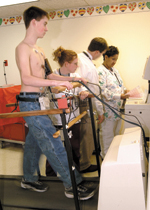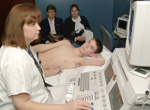‘We're all about children’
—Dr. L. Lyndon Key
First in a three-part series on the MUSC Children's Hospitalby Heather Murphy
Public Relations
A simple paradigm dictates that adults and children require different
medical treatment.
Recently, Child Magazine named MUSC Children’s Hospital the 11th Best Children’s Hospital, of 160 nationwide. This means the Children’s Hospital was recognized for its dedication to interdisciplinary cooperation, sensitivity to the developmental needs of children, and a child and family friendly environment. MUSC Children’s Hospital is a community hospital, a tertiary hospital for children with complex, chronic or congenital conditions, and a safety net for under or uninsured children. It’s also a major teaching facility, a research center, an ambulatory care provider, the center of the Children’s Heart Program of South Carolina, and the last hope for the state’s, and some of the nation’s, hardest pediatric cases.
 ‘Awesome
Austin’ Smith watches his heart rate screen during a stress test at his
checkup in March.
‘Awesome
Austin’ Smith watches his heart rate screen during a stress test at his
checkup in March.
Austin Smith of Gaston, S.C., was one of those cases.
His mother, Julie Smith, remembers thinking a bug overtook Austin while on a family skiing trip in Gatlinberg, Tenn. Usually an avid ski buff, 14 year-old Austin spent three days in a hotel room, at times vomiting and suffering from a total lack of energy.
On Monday, Dec. 16, Julie and Austin’s father, Dan, decided to take him to see his family health care provider, Jeff Kerby.
Julie likens what happened next to a whirlwind of realizations, anxiety, and terror.
Austin’s blood pressure and EKG were abnormal, so Kerby sent Austin to cardiologist Osborne Shuler, M.D., in Columbia, who then faxed his EKG to Phil Saul, M.D., chief of pediatric cardiology and director of the Children’s Hospital.
“Dr. Shuler noted his irregular heartbeat and once we received the EKG, we recognized this child needed to get here as soon as possible,” Saul said.
“As soon as Dr. Shuler told me that my son’s problem was life-threatening, I was in disbelief,” Julie said. “I mean, I brought him in for a stomach virus or a cold, not a heart problem. In the next few minutes we were loaded onto the MUSC helicopter. It was crazy. I was trying to understand what was happening to my child and also wondering what to do about my other son Mason, the house, and the dog.”
Julie’s voice quivers as she describes Austin’s seizure in the helicopter and the moment her headset was turned off. “He was in cardiac arrest and they didn’t want me to hear them working on him,” she said. Julie prayed to make it to MUSC in time.
Upon arrival at the Children’s Hospital, staff hurried Austin to the Pediatric Cardiac Intensive Care Unit. “When I met Drs. Saul and McQuinn, it was the beginning of having a truly incredible experience in the Children’s Hospital,” Julie said.
After analyzing Austin’s case and the arrival of family, Saul drew a picture of Austin’s heart for Julie, Dan, and Mason. The situation, grave at best, called for the MUSC pastoral staff to help the family prepare for the worst. Julie was touched by how the pastoral team cared for her and the family. “For the next 12 to 15 hours, Austin was surrounded by staff, the room seemed full at all times. To take over for his heart, they hooked him up to a heart and lung machine called ECMO (Extracorporeal Membrane Oxygenator) and put him into a drug-induced coma to stabilize his movement. Those ECMO and PCICU nurses were so wonderful,” Julie said.
As time drudged on, Julie and Dan were confronted with the possibility of a heart transplant. But then Saul suggested a heart catheter procedure.
“Austin was diagnosed with an incessant chronic arrhythmia. We decided to try the heart cath, but the trick was going to be moving him from the PCICU to the Cath lab, as there’s extreme danger involved in moving ECMO patients,” Saul said.
On Dec. 17, Austin’s family decided to take a chance on the heart cath procedure. The Meducare trauma team debated how to transfer Austin down the numerous hallways and elevators to the cath lab. It took an hour just to prepare Austin for the move. The family doesn’t remember breathing that night.
After the completed procedure, the stagnancy of waiting crept in as Austin’s physicians, surgeons, nurses, respiratory therapists, and others anticipated whether his damaged heart would allow him to live and if he had suffered any brain damage.
“They weaned him off ECMO on the 23rd and told us that it would be about 24 hours until we’d see anything. There was nothing else we could do. It’s hard to be so out of control, but I knew that Austin was receiving the best care possible and we trusted the staff. I was overwhelmed by the compassion, knowledge and incredible service we’d received up to that point,” Julie said.
Thirty minutes after ECMO was turned off, Austin began to ask for his parents.
There wasn’t a dry eye in the house, Julie said.
He began to ask more questions on Christmas Eve like what day it was and who won the reality TV show “Survivor.” McQuinn told Austin that he was the survivor.
“What’s so amazing about that kid was that as quick as he crashed, he came back just as fast,” she said. “Our experience at the Children’s Hospital was amazing. The staff was unbelievable and we absolutely fell in love with Drs. McQuinn, Saul, Simsic, Bradley, the residents, the ECMO nurses and the PCICU nurses.”
 Austin's
mom, Julie, and grandmother Mary Blackwell, watch intently as Austin undergoes
an echocardiogram, or ultrasound, of the heart.
Austin's
mom, Julie, and grandmother Mary Blackwell, watch intently as Austin undergoes
an echocardiogram, or ultrasound, of the heart.
Two months later, “Awesome Austin” is back in school despite tiring easily. But all things considered, he has maintained a full recovery.
“If we hadn’t been such a coordinated team within the hospital as well as with other physicians throughout the state, Austin probably wouldn’t have made it,” Saul said.
At the core of Austin’s success story lies the Children’s Heart Program of South Carolina, a unique coalition of pediatric cardiologists, cardiac surgeons, pediatric nurses, and ancillary staff who have bonded together to provide the best possible pediatric care.
“The idea was to have the experts concentrated into one place to combine expertise and provide better care. There are no published outcomes better than the ones here. We have the best pediatric cardiac care available,” Saul said.
The Children’s Hospital consists of more than one department and its successes, however.
Many children’s hospitals boast specialists in pediatrics. They’re called pediatricians. MUSC surpasses those hospitals in physician and staff expertise because in every subspecialty of pediatrics, like pediatric radiology or endocrinology, board certified physicians care for the children who enter the MUSC Children’s Hospital. This means a patient and the patient’s family can rest assured that a physician seeing a child at MUSC has extensive education and training in a particular subspecialty of pediatrics.
“It’s not easy to quantify what makes us so special,” said Lyndon Key, chairman of Pediatrics. “It’s not as much our physical facilities as it is interdisciplinary resources derived from individuals who specialize in children at every level of the Children’s Hospital. In most large institutions like ours, services for adults and pediatrics are often shared. Because we don’t have to do this, our pediatric services are very strong.”
Key mentioned intellectual capital as another benefit special to MUSC. By employing and recruiting board certified faculty who explore new therapies at every level of medicine, MUSC Children’s Hospital continues to maintain its reputation as the best children’s hospital in the Southeast.
But a successful children’s hospital includes many ingredients, not just brilliant and talented clinicians. According to Carol Dobos, Ph.D., R.N., children’s services director, the attitude that “the patient is both the patient and the family” contributes to patient and community satisfaction.
“This is truly a comprehensive children’s hospital because not only does every subspecialty have board-certified physicians, but we have incredibly good outcomes. Those outcomes are the result of experts working together and creating a synergy that results in clinical success,” she said. “The entire interdisciplinary team maintains excellent care of children from pediatric nurses and respiratory therapists to pediatric pharmacists and the Child Life staff.”
A free standing facility, the Children’s Hospital places 95 percent of all pediatrics patients in private rooms, equipped with sleeping areas for parents or guardians. All of the rooms include amenities like TV’s and VCR’s and three multi-age playrooms, including the Atrium on the seventh floor, provide a space to play, as kids like to do. The Children’s Hospital takes care of parents and guardians too, with 11 support groups and 24 hour visitation. Nurses to patient ratios are incredibly low, like in the PICU where one nurse cares for every patient.
“The high-tech physical aspects of the Children’s Hospital combine with superior interdisciplinary care to create an environment, absent in community a hospital, that shouts ‘We’re all about children’,” Key said.
“Being number 11 and the best in the Southeast means you can care for every aspect of the child from medical to psychological and emotional pediatric care,” Saul said.
To the staff of MUSC:
This past Christmas our family spent our vacation with you. Going through
a traumatic experience is overwhelming in many ways. How do we say thank
you in a few words or let you know our appreciation for helping our son.
We remember so many of your names and faces, and the care you gave Austin, both physically and emotionally.
As you healed his heart, you touched ours.
When you would call or come by and see him on your days off, we were totally blown away.
You each do your job so well, with care and compassion. We couldn’t have asked for a better group of people. We believe that’s one of many miracles we witnessed during our ordeal. We will never forget last Christmas, and the experience changed our lives forever. It was amazing to see the goodness of so many.
Thank you from the bottom of our hearts and God bless!
Austin Smith’s family
Catalyst Online is published weekly, updated as
needed and improved from time to time by the MUSC Office of Public Relations
for the faculty, employees and students of the Medical University of South
Carolina. Catalyst Online editor, Kim Draughn, can be reached at 792-4107
or by email, catalyst@musc.edu. Editorial copy can be submitted to Catalyst
Online and to The Catalyst in print by fax, 792-6723, or by email to petersnd@musc.edu
or catalyst@musc.edu. To place an ad in The Catalyst hardcopy, call Community
Press at 849-1778.